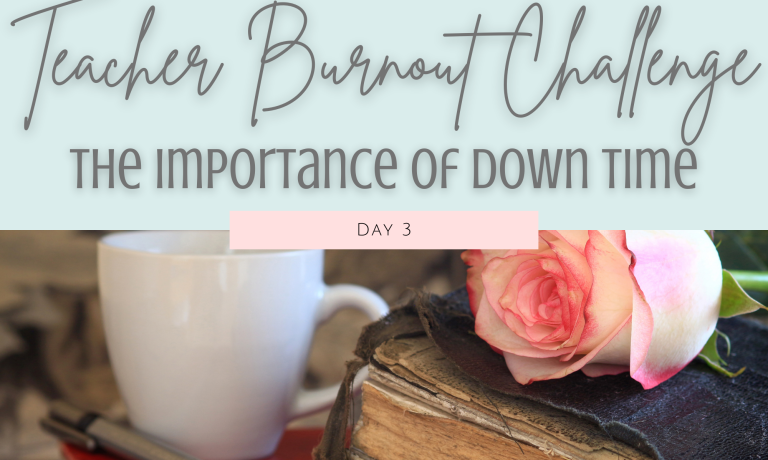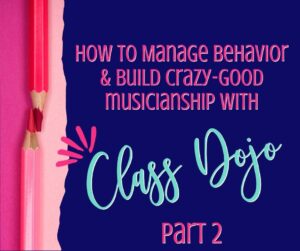The Importance of Down Time
Do you put a lot of value on outcomes and achievements? If you’re anything like me, you do and you may also have a difficult time understanding the benefits of down time. Why? Because we’re teachers and high achievers; we tend toward seeing down time as being too unproductive, or a literal “waste of time.” I assure you, it’s not. In fact, it is a requirement to avoid burnout and fatigue. Here’s why:
- Down time rejuvenates you
- Down time allows your brain to rest
- Down time frees up space for creativity
- Down time lets you connect with your family
- Down time helps prevent depression
- Down time offers you some perspective
Down time is designed to get you out of the fast-lane of life and onto the country back road. Down time allows you to experience the things you work so hard for, such as your family, your hobbies, your environment, and expressing your true self. Each day that you are working or focused on responsibilities, you can’t fully be in the moment with those you are working for: yourself and your family. What’s the point of all that work if you never let yourself experience the fruit of it?
In some cultures, down time is built into the structure of society. Whether through fasting, honoring the sabbath, an extended daily lunch hour(s), or engaging in a tradition that requires them to shift their focus away from their career and toward their family and faith. Even in modern secular society, most employment requires a limit on hours worked in a day or days worked in a row. This is to prevent exhaustion and burnout. To stop us from literally working ourselves to death. Because, knowing me, I might.

Whether you prefer down time to be daily, weekly, monthly, or annually; you should build it into your life as a way to disconnect from what you think matters most and reconnect with what really does matter most. One of the most essential things you can do for yourself is to build in a routine of rest. Your body and mind need to develop a habit of looking forward to, and following through on rest. Even having little moments in your calendar that you can look forward to can help lower some of the stress hormones you build up in your system during the day.
Here are some ways to build down time into your life (and COVID alternatives):
Daily-
✓30 minutes of prayer or journaling– I’ve always been a writer. One of my best friends bought me a gratitude journal several years ago and I still use it nearly every night. Remembering what we’re grateful for helps counter bitterness. I will have and always will truly believe that.
✓30 minutes of reading
✓Exercise
✓Meditation (If you’re on the Christian spectrum, I highly suggest “Jesus Calling” by Sarah Young. If you want something more secular, the 10% Happier Podcast by Dan Harris is fantastic!)
✓One-on-one time with family, a parent, a close friends, a child or even a pet.

Weekly-
✓Massage (we might not be able to do this now, but dang it, when this whole pandemic is all over, 100% of the world has earned a massage!)
✓Date night (one of my most fun recent date nights was binging Haunting of Bly Manor with my hubs. It doesn’t have to be fancy, it just has to be intentional.)
✓Family game night
✓Sunday dinner (consider a weekly ZOOM/Google Hangouts with your extended family. Embrace the ability to spend some time connecting with those who live far away via technology.)
✓Church (I’ve been attending church through Youtube since March. Is it the same as going in person? No. But it does still recenter me and helps me re-establish my place in the universe.
✓Naps (or at least a designated 30mins-hour of quiet time every evening/afternoon).
Monthly-
✓Host or attend a dinner with friends (in the Spring, I hosted virtual game night for my school staff every week for a while. Even when we couldn’t be together, we were able to laugh and build community anyway.)
✓Volunteer in your community or church (you do NOT have to volunteer in person these days. Since I’ve been on quarantine, I’ve helped raise money for our local fire department chapter and have written letters to lonely residents at one of the local retirement homes. Get creative! If you need ideas, reach out with a comment! I’ve got tons!)
✓Engage in a social activity outside your home. (I’ve always loved going to the dog park. No one ever talks about anything important– just dog stuff. Right now, it’s been a great way to have social connection with my neighbors outside where I can socially distance myself.)
✓Rent a movie you haven’t seen in years
✓Complete an art or hobby project (I learned to craft over quarantine. I’d also highly suggest ordering a paint-by-number set on Amazon. Zero skill needed and it always turns out great!)
Annually-
✓Host or attend a family reunion (when was the last time you saw your extended family? If you’re anything like me, it’s been a solid while! Consider setting up a virtual family reunion this year– you can even assign people to breakout rooms to chat in smaller groups and rotate every 10 minutes)
✓Take a vacation or a “stay-cation” (My mom was and always will be the queen of staycations. One of our favorite family past-times has been a “luau” where we eat Hawaiian Plate Lunch food, listen to Hawaiian music, and drink fruit smoothies and mocktails. It’s even been one of our fun family experiences we’ve had, socially distanced.)

It’s important to plan for and establish a routine of down-time. And trust me, down-time is very frowned upon in our culture and society and I KNOW it feels self-indulgent and ridiculous at first. But, let me ask you this– if you’re already feeling burned out, why on EARTH would you want to continue living the way you are? Isn’t that what lead you here?
It’s vital as teachers that we work to develop healthy habits that we can use to fall back on in times of crisis. Our bodies were not made to house the amount of stress and tension that they do, and I would argue that, given the option, they’ll break before you do (illness, injuries, tension headaches.) Knowing this, start small. If you’re a workaholic, begin with 15 minutes of quiet time.
But don’t let ANYTHING (except maybe the world ending or a child screaming) get in your way. It won’t be perfect at first. There will be distractions. But come back to it again and again. Your body will start adjusting to a sense of peace and you’ll be able to better realize when you need to put the brakes on in your daily life.
Daily Challenge:
Set yourself a 30 minute timer for quiet-time before bed tonight. Turn off technology and do something quiet and low-key to prepare your body and mind for rest. If you have little kids, even better! Involve them and develop a new routine bedtime routine to help show them work-life balance. Even with teens, having a daily chat (you bring the snacks to their bedroom) just to check in before bed & connect for a couple minutes, will help build in a quiet, social routine that helps re-establish peace.
It won’t be perfect at first. That’s ok. Keep being intentional. It’ll get easier.





